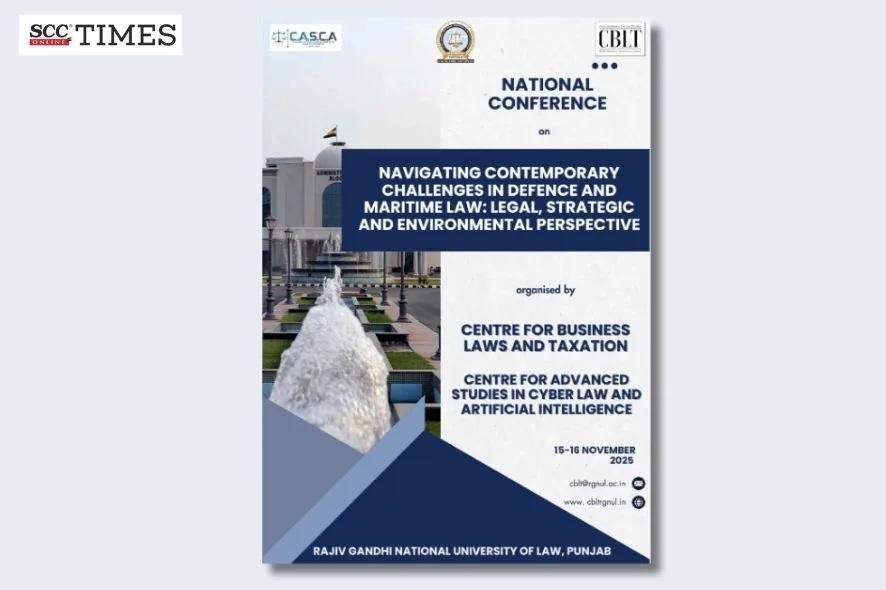About the University
The Rajiv Gandhi National University of Law (RGNUL), Punjab, was established by the State Legislature of Punjab by passing the Rajiv Gandhi National University of Law, Punjab Act, 2006 (Punjab Act No. 12 of 2006). The Act incorporated a University of Law of national stature in Punjab, to fulfil the need for a Centre of Excellence in legal education in the modern era of globalization and liberalization.
Recently, the University has earned the coveted status of being one of the top-ranking law teaching institutions in the country. Over 1000 students acquire state-of-the-art legal education in a fully developed residential campus with all infrastructural and manpower facilities for overall student growth.
RGNUL is currently emphasizing research, training, and consultancy in various areas of contemporary interest. It has as many as 19 research centres focusing on socio-legal areas, including the Centre for Business Laws and Taxation (CBLT). The University publishes five journals covering diverse legal and social issues.
About CBLT
The Centre for Business Laws and Taxation (CBLT) is one of RGNUL’s flagship centres, aimed at bridging the gap between theory and practice in corporate law. It promotes comparative research, discussion, and policy analysis across corporate governance, insolvency law, mergers and acquisitions, taxation, and related areas.
The Centre organizes academic courses, programs, and publications, while also fostering industry-academia collaborations. It adopts a multi-disciplinary approach to addressing corporate law challenges and cultivates a culture of dialogue to shape the next generation of corporate lawyers and researchers.
About CASCA
The Centre for Advanced Studies in Cyber Law and Artificial Intelligence (CASCA) strives to bridge the gap between technological advancements and legal frameworks. It provides a platform for scholars, practitioners, and students to engage with pressing issues at the intersection of law and technology.
CASCA’s interdisciplinary focus contributes to developing effective regulatory policies that address challenges of the digital era, especially concerning cyber law, AI, and maritime cyber threats.
About the Conference
India’s strategic maritime domain plays a vital role in defence preparedness, economic development, and global diplomacy. With the Indo-Pacific region gaining prominence, India faces growing maritime disputes, environmental concerns, and non-traditional threats such as piracy, illegal fishing, and cyber warfare.
This two-day National Conference will provide a platform for deliberations on the evolving contours of Defence and Maritime Law, focusing on national security, international maritime frameworks, environmental sustainability, and technological innovations.
The event will include panel discussions with maritime experts, defence analysts, academicians, and legal practitioners, alongside research paper presentations to promote academic exchange and policy innovation.
Objectives of the Conference
-
To explore legal, environmental, and strategic dimensions of India’s maritime and coastal security frameworks.
-
To analyze the role of international conventions, regional collaborations, and national laws in shaping maritime defence.
-
To discuss emerging threats like maritime cyber warfare, piracy, illegal fishing, and autonomous vessels.
-
To examine evolving jurisprudence and regulatory mechanisms for maritime disputes and diplomacy.
-
To understand the significance of sustainable development, blue economy, and environmental compliance in maritime law.
Sub-Themes
-
Evolution of legal standards addressing data breaches and digital warfare at sea.
-
Constitutional and statutory mandates of coastal state enforcement.
-
Defence Laws and Contemporary Challenges.
-
Legal implications of Integrated Maritime Domain Awareness (IMDA).
-
Cybersecurity threats to maritime infrastructure and autonomous vessels.
-
International and national legal approaches to piracy and maritime terrorism.
-
UNCLOS and India’s anti-piracy enforcement challenges.
-
MARPOL compliance and domestic environmental laws.
-
Indian Coast Guard’s role and liability regimes in marine pollution.
-
Legal dimensions of the Blue Economy and marine spatial planning.
-
Arbitration in port infrastructure contracts.
-
Regional defence collaborations, Colombo Security Conclave, and the SAGAR doctrine.
(Note: Papers outside these themes but relevant to the core topic will also be considered.)
Timeline and Details
-
Conference Dates: 15—16 November 2025 (Offline, RGNUL, Punjab)
-
Last Date for Abstract Submission: 15 September 2025
-
Last Date for Final Paper Submission: 15 October 2025
-
Last Date for Registration: 30 October 2025
Fees:
-
INR 1000 + GST (Academicians, Advocates, Practitioners)
-
INR 750 + GST (Students & Research Scholars)
-
INR 500 + GST (Co-authors under both categories)
(Fee once paid is non-refundable. Certificate of participation will be provided.)
Paper Submission Guidelines
-
Abstract (~350 words) with author details by 15 September 2025.
-
Papers (max. 6000 words, Times New Roman, 12 pt, 1.5 spacing, 1-inch margins).
-
Citations strictly as per Bluebook 20th Edition.
-
Selected papers may be published at the discretion of the University.
To know more click on Maritime Conference Brochure







